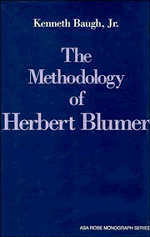4 - Methodical holism: Issues and applications
Published online by Cambridge University Press: 15 December 2009
Summary
Throughout the course of Blumer's methodology, we have witnessed the persistence of methodical holism as a central theme. We also saw how Blumer's empiricism grew to override that theme, pressing Blumer to formulate his position as a methodical atomism even as that formulation clashed with his actual practice. This basic inconsistency cannot stand uncorrected.
In fact, we have already achieved a correction in our critical rejection of Blumer's look-and-see empiricism. With an alternative formulation – an empiricism which admits super-sensible universals and construes experience synthetically – we have established an orientation which provides for holism at the level of method. Indeed, methodical holism is but one aspect of theory testing viewed as a reflexive movement. The latter, generally stated, refers to the inclusion of theory, method, and data within a sphere of discourse conceived as categorial synthesis. This is to say that a common semantic framework interpenetrates all three elements and binds them together in one discursive region. Without such binding the discourse of science would fall apart into disparate elements, and it would be quite impossible to conceive data as testing theory for the simple reason that data would have no relevance to theory.
One example might clarify the point. Assume the statement “all swans are white” to be a theory that we would like to test empirically.
- Type
- Chapter
- Information
- The Methodology of Herbert Blumer , pp. 64 - 100Publisher: Cambridge University PressPrint publication year: 1990

